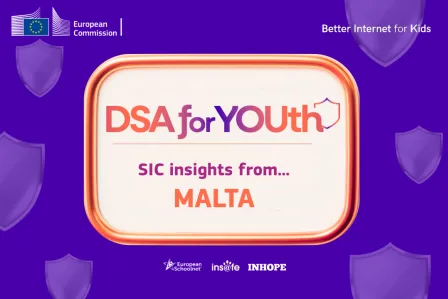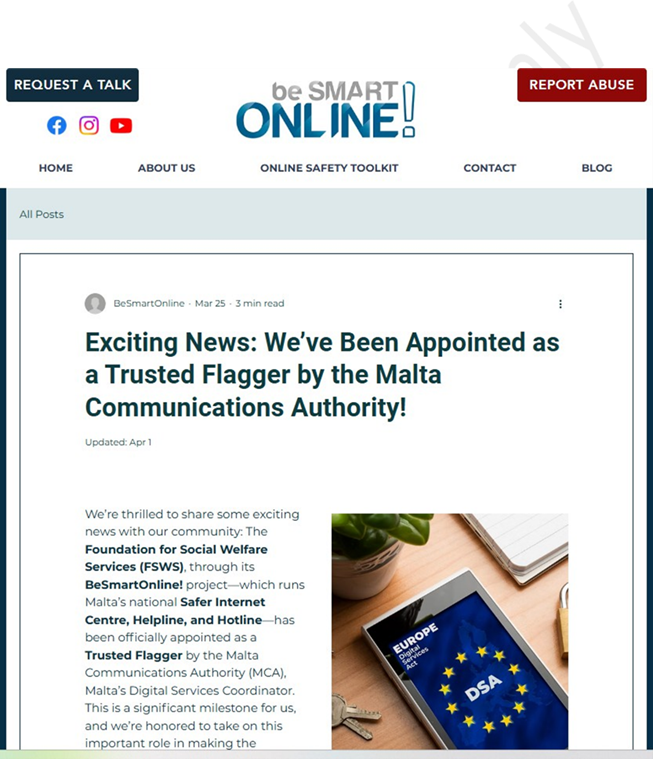This article is part of the campaign DSA for YOUth - Protecting minors by design, focusing on the DSA guidelines for the protection of minors under the DSA, including the age verification (AV) and age-appropriate (AA) measures, and translating these rules into clear, practical, and jargon-free resources. In this insight series, we explore how different Safer Internet Centres are working at the national level to raise awareness about the DSA and how it impacts the everyday lives of young people, their parents or caregivers, and teachers and educators.

The Maltese Safer Internet Centre (SIC), coordinated by the Foundation for Social Welfare Services (FSWS), consistently refers to the DSA during sessions with both children and parents in schools. The SIC is a trusted flagger, and this role is highlighted along with how the SIC can support them. Read on to learn more about its work for – and with – different stakeholder groups.
Children and young people
A short promotional video on the DSA was created in collaboration with youth ambassadors. This video was disseminated to all national schools to be shown around the time of Safer Internet Day (celebrated in February each year). Its creation was a joint effort between the Foundation for Social Welfare Services (FSWW), the Office of the Commissioner for Children, and the Cybercrime Unit within the Malta Police Force, ensuring a unified and coherent message.

In addition, a series of focus groups involving over 200 children and young people across Malta and Gozo provided valuable insights into their online experiences and the areas they felt needed attention in the DSA.
The discussions highlighted key concerns relevant from a DSA point of view, including:
- Online safety, digital well-being and mental health implications:
- Young people frequently encounter cyberbullying, harassment, and harmful content.
- They emphasised the need for stronger content moderation and mental health support tools.
- Algorithmic transparency:
- Concerns were raised about how algorithms amplify harmful content (misinformation, extremism) and how this shapes their online experiences.
- Young people expressed a desire for more control and better transparency over recommended content.
Teachers and educators, parents and caregivers
A wider range of sessions on the DSA were conducted during stakeholder meetings and as part of ongoing educator training sessions to raise awareness about the DSA and the trusted flagger status of the SIC. For example:
A press release was issued announcing the SIC being designated as a trusted Flagger. This was further supported by news articles and social media coverage.

Press release announcing the Maltese SIC's designation as a trusted flagger - The SIC has integrated discussions on the trusted flagger role within its Wise use of technology sessions, ensuring professionals and parents understand the significance of the DSA and its impact.
Research
New research is underway in Malta, led by the Office of the Commissioner for Children and focusing on gaming and excessive use among children and young people. The results, due for release in November 2025, may offer valuable insights relevant to the aims of the DSA, particularly in identifying risks and informing future initiatives for child safety online. These findings will further support national efforts under the DSA for YOUth, depending on their outcomes.
Working with the DSC
Digital Services Coordinators (DSCs) help the European Commission to monitor and enforce obligations in the Digital Services Act. Each Member State must designate and empower a DSC, who is responsible for all matters relating to the application and enforcement of the DSA in that country. Furthermore, DSCs can designate trusted flaggers, responsible for detecting potentially illegal content and alerting online platforms.
In Malta, the relationship with the DSC has grown stronger since the Foundation for Social Welfare Services gained trusted flagger status in February 2025. FSWS is now regularly involved in stakeholder meetings organised by the DSC (the Malta Communications Authority (MCA)), including recent events such as a roundtable on the protection of minors under the DSA. This close cooperation ensures ongoing dialogue, shared best practices, and rapid responses to emerging issues in online child protection.
Interested in learning more about the DSA?
If you are interested in more, explore the DSA for YOUth toolkit to learn how the Digital Services Act (DSA) protects minors by design. There, you will find a family-friendly booklet explaining the DSA guidelines on what online platforms should do to keep kids and teens safe online, easy-to-read explainers, a quiz, and other resources.
Interested in learning more about activities in Malta?
Find more information about the work of the Maltese Safer Internet Centre, including their awareness raising, helpline, hotline, and youth participation services – or find similar information for Safer Internet Centres throughout Europe.
This article is part of the campaign DSA for YOUth - Protecting minors by design, focusing on the DSA guidelines for the protection of minors under the DSA, including the age verification (AV) and age-appropriate (AA) measures, and translating these rules into clear, practical, and jargon-free resources. In this insight series, we explore how different Safer Internet Centres are working at the national level to raise awareness about the DSA and how it impacts the everyday lives of young people, their parents or caregivers, and teachers and educators.

The Maltese Safer Internet Centre (SIC), coordinated by the Foundation for Social Welfare Services (FSWS), consistently refers to the DSA during sessions with both children and parents in schools. The SIC is a trusted flagger, and this role is highlighted along with how the SIC can support them. Read on to learn more about its work for – and with – different stakeholder groups.
Children and young people
A short promotional video on the DSA was created in collaboration with youth ambassadors. This video was disseminated to all national schools to be shown around the time of Safer Internet Day (celebrated in February each year). Its creation was a joint effort between the Foundation for Social Welfare Services (FSWW), the Office of the Commissioner for Children, and the Cybercrime Unit within the Malta Police Force, ensuring a unified and coherent message.

In addition, a series of focus groups involving over 200 children and young people across Malta and Gozo provided valuable insights into their online experiences and the areas they felt needed attention in the DSA.
The discussions highlighted key concerns relevant from a DSA point of view, including:
- Online safety, digital well-being and mental health implications:
- Young people frequently encounter cyberbullying, harassment, and harmful content.
- They emphasised the need for stronger content moderation and mental health support tools.
- Algorithmic transparency:
- Concerns were raised about how algorithms amplify harmful content (misinformation, extremism) and how this shapes their online experiences.
- Young people expressed a desire for more control and better transparency over recommended content.
Teachers and educators, parents and caregivers
A wider range of sessions on the DSA were conducted during stakeholder meetings and as part of ongoing educator training sessions to raise awareness about the DSA and the trusted flagger status of the SIC. For example:
A press release was issued announcing the SIC being designated as a trusted Flagger. This was further supported by news articles and social media coverage.

Press release announcing the Maltese SIC's designation as a trusted flagger - The SIC has integrated discussions on the trusted flagger role within its Wise use of technology sessions, ensuring professionals and parents understand the significance of the DSA and its impact.
Research
New research is underway in Malta, led by the Office of the Commissioner for Children and focusing on gaming and excessive use among children and young people. The results, due for release in November 2025, may offer valuable insights relevant to the aims of the DSA, particularly in identifying risks and informing future initiatives for child safety online. These findings will further support national efforts under the DSA for YOUth, depending on their outcomes.
Working with the DSC
Digital Services Coordinators (DSCs) help the European Commission to monitor and enforce obligations in the Digital Services Act. Each Member State must designate and empower a DSC, who is responsible for all matters relating to the application and enforcement of the DSA in that country. Furthermore, DSCs can designate trusted flaggers, responsible for detecting potentially illegal content and alerting online platforms.
In Malta, the relationship with the DSC has grown stronger since the Foundation for Social Welfare Services gained trusted flagger status in February 2025. FSWS is now regularly involved in stakeholder meetings organised by the DSC (the Malta Communications Authority (MCA)), including recent events such as a roundtable on the protection of minors under the DSA. This close cooperation ensures ongoing dialogue, shared best practices, and rapid responses to emerging issues in online child protection.
Interested in learning more about the DSA?
If you are interested in more, explore the DSA for YOUth toolkit to learn how the Digital Services Act (DSA) protects minors by design. There, you will find a family-friendly booklet explaining the DSA guidelines on what online platforms should do to keep kids and teens safe online, easy-to-read explainers, a quiz, and other resources.
Interested in learning more about activities in Malta?
Find more information about the work of the Maltese Safer Internet Centre, including their awareness raising, helpline, hotline, and youth participation services – or find similar information for Safer Internet Centres throughout Europe.
- DSAforYOUth DSA (Digital Services Act)
Related content
- < Previous article
- Next article >













